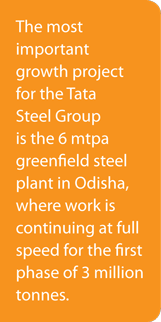|
Dear Shareholders, During the year, the world economy has struggled on a path to uniform and widespread economic stability. Most emerging markets and developing economies have shown moderate growth, whereas the developed economies have moved on divergent paths, with pickup in growth in the US and weak economic conditions in the euro zone area. The Indian economy has slowed down in the last 12 months and some of the sectors including the automotive and capital goods have been faced with demand slowdown that is unlikely to turnaround quickly. The Chinese economy too has witnessed a moderation in its growth rate and it is widely expected that following the political transition, China would look at rebalancing the economy to a sustainable level. In 2012, the world's crude steel production stood at 1.54 billion tonnes, an increase of roughly 0.7% over the previous year. This has been the slowest rate of growth since the crisis of 2008. The overhang of the economic crisis and significant overcapacity in regions like Europe and China continues to stress global capacity utilisation and the demand supply balance. In our key overseas markets of Europe and UK where the Company has significant manufacturing presence, the economic downturn has significantly affected steel demand, which is now almost 30% lower than the pre-2008 financial crisis level. The outlook for the euro zone area currently continues to be depressed and we have had to revise our cash flow expectation and valuations of the Group's European operations. It is in this context, that we took an impairment charge in the last quarter. A clear industrial policy with special emphasis on manufacturing competitiveness and infrastructure spending will be the key requirement for revival of demand in markets like the UK. On the operational front, we have made significant progress in the last year. In India, the Company commissioned the 3 mtpa brownfield expansion project at Jamshedpur. The facilities have been gradually ramping up and should enhance the product offerings and earnings of the Tata Steel Group in the future. The operational capabilities in Europe have also been strengthened on the back of investments made in the last year that included the rebuilding of a blast furnace at Port Talbot in the UK and the improvement initiatives that are targeted at efficiency enhancements, product rationalisation and restructuring. These actions should improve the competitiveness of the European operations even though the market is expected to remain challenging. The South-East Asian operations have already started reporting better results on the back of restructuring initiatives undertaken earlier. The operational initiatives across the Group are aimed to make the Tata Steel Group a stronger and more competitive business that can withstand external shocks better and create long-term value for its stakeholders. 
The most important growth project for the Tata Steel Group is the 6 mtpa greenfield steel plant in Odisha, where work is continuing at full speed for the first phase of 3 million tonnes. All efforts are concentrated on commissioning the first phase of the project as per schedule, which when ready, will help strengthen the product portfolio in India and help rebalance steelmaking capacities across the Group. Despite several challenges, the management team is currently working very hard to ensure timely completion of the project and build state-of-the-art facilities that will enhance Tata Steel's market positioning and generate life cycle returns for its shareholders. The consumption of steel, a key ingredient in several industries such as construction, infrastructure, automobiles and consumer goods, will continue to be linked closely to the economic prospects of a country or region. In the face of volatile raw material prices and systemic weakness in demand in key markets, the next 18-24 months will be challenging for Tata Steel. However, I believe, we will emerge on a stronger footing, through a series of management initiatives targeted at strengthening our core operations including investment in select facilities, product rationalisations and right-sizing of manufacturing assets. In these trying times, I would like to place on record my appreciation to all employees, unions, lenders, shareholders and other stakeholders, for their dedication and support. Tata Steel is committed to improving the efficiencies in its operations and differentiating itself in the market-place through customer focussed innovation in product and services, so as to build a stronger and sustainable future for our Company. Finally, I would like to thank our Chairman Emeritus Mr. Ratan N. Tata for his visionary leadership and extraordinary stewardship with which he led the Company through many challenges during his tenure as the Chairman of Tata Steel. Cyrus P. Mistry Mumbai, 11th June, 2013 |

The operational |
|

- Management
- |
- Financial Highlights
- |
- Integrated Reporting
- |
- NVG Principles
- |
- Directors' Report
- |
- MDA
- |
- Financials
- Balance Sheet
- Profit & Loss Account
- Cash Flow Statement
- Notes
- Auditors' Report on Consolidated Financial Statements
- Consolidated Balance Sheet
- Consolidated Statement of
Profit and Loss - Consolidated Cash Flow Statement
- Notes to Consolidated Balance Sheet and Statement of Profit and Loss
- Attendance Slip and Proxy Form
- The Deming Grand Prize
- |
- Notice
- |
- Downloads
Home  Management Management  Chairman's Statement Chairman's Statement
|
Chairman's Statement |
